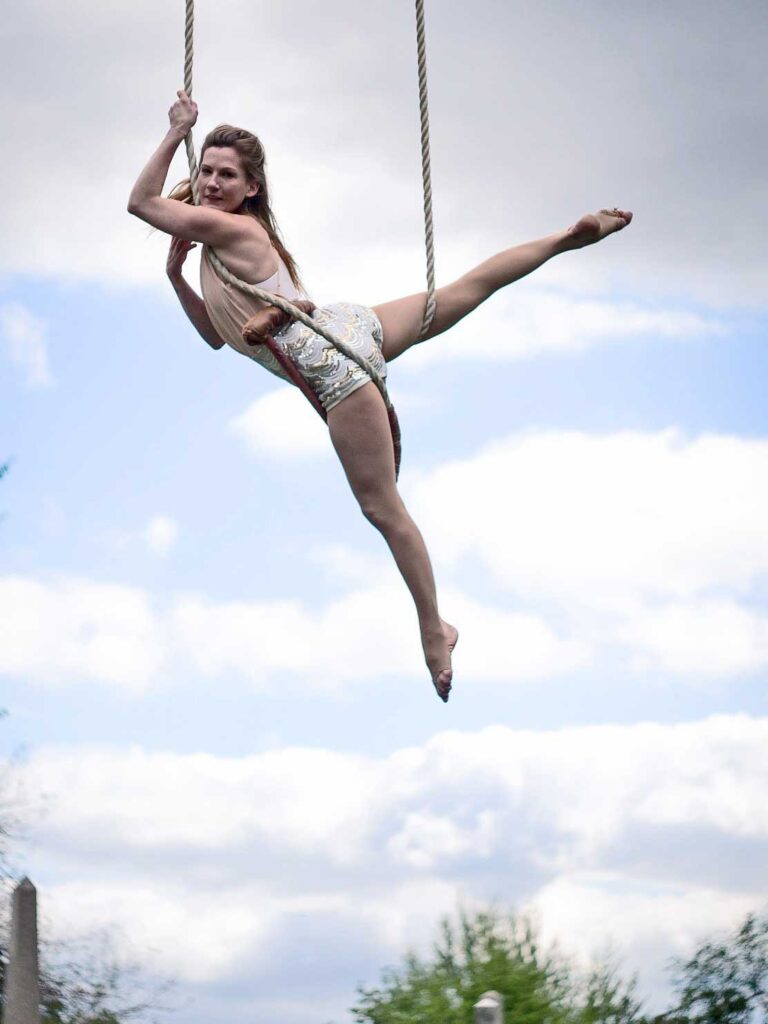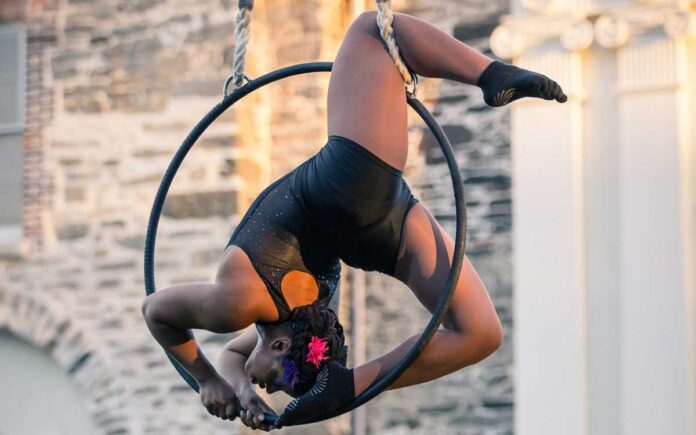As part of the 2020 Fringe Festival, Tangle Movement Arts will present the show “The Way Out,” a series of live performances featuring local dance and theater artists. Taking place from Oct.1 to 3 and spanning 78 acres of Laurel Hill Cemetery, “The Way Out” encompasses multi-genre, immersive performances that tackle the question “what is the way out of our current moment?”
Tangle Movement Arts is a circus arts company that tells multi-faceted stories through a combination of trapeze, acrobatics, theater, dance and live music. The company’s ensemble strives to highlight queer and female experiences through their performances.

“Tangle was founded as a queer, all-female circus company, because we feel that circus has a radical potential to question our assumption about gender, bodies, and the way people relate to one another,” Lauren Rile Smith, Tangle’s founder, said in an email. “Circus as a movement practice inherently challenges notions of what humans can do with their bodies, from feats of upside-down strength, to rejecting traditionally gendered expression – people of all genders do pull-ups, point their toes and defy gravity.”
“The Way Out” will be presented in a socially distant manner, in accordance with Philadelphia’s guidelines for outdoor performances. Audience members will drive through the cemetery and park their cars to experience each performance, which consist of dance, physical theater, live flameworking, kinetic sculpture and aerial performance.
“Our inspiration for this show was entrapment and release, the two dynamics of quarantine,” Smith said. “We are trapped in our houses, in our responsibilities, in our bodies, in our fear. Yet we’re released from some of our typical roles, from our normal experience of time, from usual social expectations.”
The show’s performers include dance artists and choreographers Evalina “Wally” Carbonell and Weiwei Ma; Madeline Rile Smith, a sculptor who specializes in glass and has an affinity for interactive art steeped in ritual and transformation; Ama Gora, a Black, queer dancer, choreographer and founder of Ma’at Works Dance Collective whose work focuses on identity, trauma and restoration from a Black, queer viewpoint; Eppchez!, a queer and trans Quaker, Cuban and Jewish artist who founded the music and theater-centric production company Alma’s Engine; and Christina Eltvedt, a multidisciplinary artist, choreographer and educator who fashions visual, emotional performances through objects and site-specific locales.
Thematically, “The Way Out’s” performances encompass issues of systemic racism, protest, mutual aid, loss, grief and ways of staying connected despite the need to be physically apart.
Ama Gora’s piece in this show, “Project Assata,” centers on Assata Shakur, who was a member of the Black Panther Party, and comments on the racist foundation of government.
“[My piece] questions a timeline of rioting, organizing and protesting,” Gora said in an email. “Observing how rage is and was a large driver in these movements. I question how Black femmes are taught that rage is distasteful. Historically, the United States has always positioned itself against various dissent groups such as the Black Panther Party. What does it mean for Black folk to be stopped from protecting themselves? [From] building long lasting infrastructure? Initially reading Assata Shakur’s autobiography made me angry. I was rageful and wanted to talk about women like Shakur.”
Peppered with themes of quarantine, uprisings and tension among the American people, Eppchez!’s performance employs vocal looping and choreography to conjure periods of isolation and release that many are experiencing during these times of physical distancing. The work “is specifically paying homage to the organizing of a mutual aid network born out of the queer black ingenuity of my beloved chosen family,” Eppchez! said in an email.
“This moment is not jigsaw puzzles and sourdough bread – it’s death and grief and a time to reckon with history and make space for rightful rage,” Eppchez! continued. “I find myself obsessed by the idea that this dire circumstance could be a window to the liberated future that we dream of and work towards in my household – where a person’s worth is not determined by their financial success, where food, safe housing, healthcare and being treated with respect is just what humans commit to creating for each other. A future where white people recognize the full weight of history, why it still matters, and become motivated to meaningfully share and give back the wealth we have extracted from black and brown communities because we owe an unfathomable debt.”
Eltvedt’s scene embodies the notion of unraveling via movement and textiles. “It seems we are collectively in a period of drastic change and reordering,” Eltvedt said in an email. “The unraveling of known and familiar is occurring and many of us are scared and uncomfortable. I’m looking for the beauty in weaving something new.”
Carbonell’s and Ma’s scene underscores connections between bodily memories and those of the earth. “Our blood has memories as does the earth and they speak to each other in a curving, heated flow of movement,” Carbonell said in an email. “This duet speaks to the current social climate in that it connects the innermost memories and secrets of humans to one another and the world around them.”
Some of the performers’ queer identities are undeniably entwined in their artistic work, even if the material does not specifically address LGBTQ+ issues.
“As a visibly queer and trans person it is impossible to separate the queerness from my work,” Eppchez! said in an email. “Just as it is impossible for me to separate the politics of being a white-passing mixed person who shares community predominantly with other queer people of color.”
“As a queer black woman I find that my queerness is always a part of my work,” Gora said. “It may not be the central theme in works like “Project Assata,” but there is an ever present dialogue about queerness happening.”
“The Way Out” will take place at Laurel Hill Cemetery at 3822 Ridge Ave. on Thursday, Oct. 1, Friday, Oct. 2 and Saturday, Oct. 3. Performance times are rolling from 7–8:40 p.m. One $100 ticket admits one car, regardless of how many people are inside. The rain date will be Oct. 4.

